In the morally unambiguous world of Harry Potter, Sirius Black is basically a saint, sacrificing himself on behalf of oppressed groups like werewolves and Muggle-borns. The actor who portrays him, it turns out, is somewhat less concerned about minority issues: In a Playboy interview published on Monday, Gary Oldman defends Alec Baldwin’s homophobic slurs and Mel Gibson’s ranting against Jews, saying, “He got drunk and said a few things, but we've all said those things. We’re all fucking hypocrites.”
Oldman has already apologized in an open letter to the Anti-Defamation League. But will the public forgive him? If done well, a public apology can make the wrongdoer seem sympathetic; Bill Clinton’s public approval ratings, for instance, actually rose when he apologized for his affair with Monica Lewinsky.
Social scientists who've studied public apologies say it doesn't look too good for Oldman. “The whole first paragraph of Oldman's apology is about his feelings and him not having a chance to clarify," said Karen Cerulo, a sociology professor at Rutgers University and co-author of a new paper in Social Psychology Quarterly on why some public apologies succeed while others fail. "In analyzing apologies, we found that when people did not put the victims front and center and actually begin the apology by talking about the people they had victimized, their apologies tended to have less successful receptions." And when Oldman says, "Upon reading my comments in print—I see how insensitive they may be," Cerulo says, he isn't fully taking responsibility; he's putting some of the blame on the victims, for interpreting his comments as offensive. "I would call this offender-driven," says Cerulo.
Cerulo, along with Montclair State University sociologist Janet Ruane, analyzed 183 apologies delivered by public figures between 2000 and 2012. By looking at the apologies alongside public opinion polls, Cerulo and Ruane were able to identify factors that make apologies more or less likely to elicit forgiveness. Using Google and a search engine that catalogs transcripts of major newspapers, magazines, and media interviews, they identified 183 apologies that were covered by at least five news outlets.
According to their analysis:
- Politicians were more likely than any other occupational group to need to deliver a public apology: They make up 32 percent of the sample. Other apologetic professions include show business (20 percent), business (13 percent), media (13 percent) and sports (8 percent).
- Twenty-one percent of people were apologizing for racism or bigotry, and another 21 percent were saying sorry for poor job performance. Personal insults (18 percent), criminal or violent acts (14 percent), and sexual misconduct (13 percent) also elicited apologies.
- Fifty-four percent of offenses involved some kind of action, while 46 percent were purely verbal.
- Eighty-one percent of the people apologizing were male, and 85 percent were white. “This may be because white males are more likely to occupy social spaces in which highly visible offenses occur,” write the authors. “White males also may be more able to command attention for their apologies as they are far more likely than others to be the CEOs, politicians, and religious leaders of the day.”
“Mortification” was the most popular strategy for public mea culpas (the researchers also identified denial, evasion, reduction, and corrective action), with 32 percent of apologies falling under that category. It was also the most effective strategy. “We classified apologies as mortification when offenders unequivocally admit shame and guilt and explicitly ask the public for forgiveness,” explain the authors. For instance, Olympic runner Marion Jones’s apology for using steroids:
It is with a great amount of shame that I stand before you and tell you that I have betrayed your trust. I want all you to know that today I plead guilty to two counts of making false statements to federal agents. Making these false statements to federal agents was an incredibly stupid thing for me to do, and I am responsible fully for my actions.
Less successful were tactics that included evasion—epitomized in Chris Brown’s “apology” for vandalizing the set of “Good Morning America” when a broadcaster brought up a topic Brown had asked not to discuss:
I felt like they told us this just so they could get us on the show so they can exploit me. ... So I took it very, very hard.
The public also didn’t respond well to “reduction,” a technique employed by Rosie O’Donnell after she mocked Asian accents on “The View”:
So apparently "chingchong," unbeknownst to me, is a very offensive way to make fun, quote-unquote, or mock, Asian accents.
Cerulo and Ruane also considered how the apology was structured; did the apologizer focus on the feelings of the victim, or did they talk about themselves first? “How one organizes a plea for pardon—for example, the sequencing of apology elements—is as important to forgiveness as what one says,” write Cerulo and Ruane. “Victim-driven sequences are significantly associated with greater forgiveness in comparison to the other sequential structures.”
